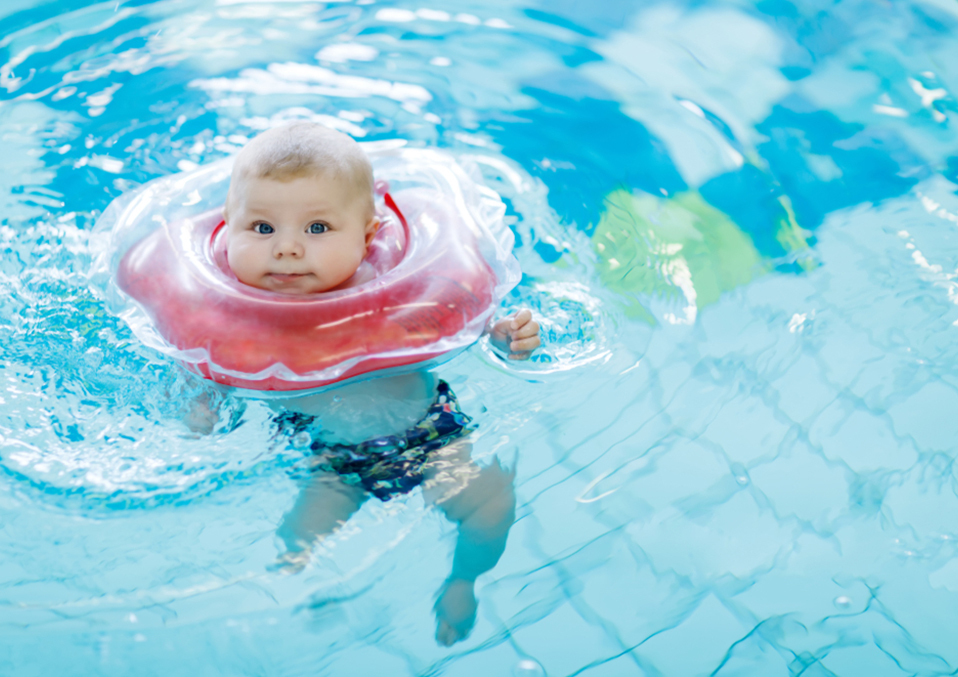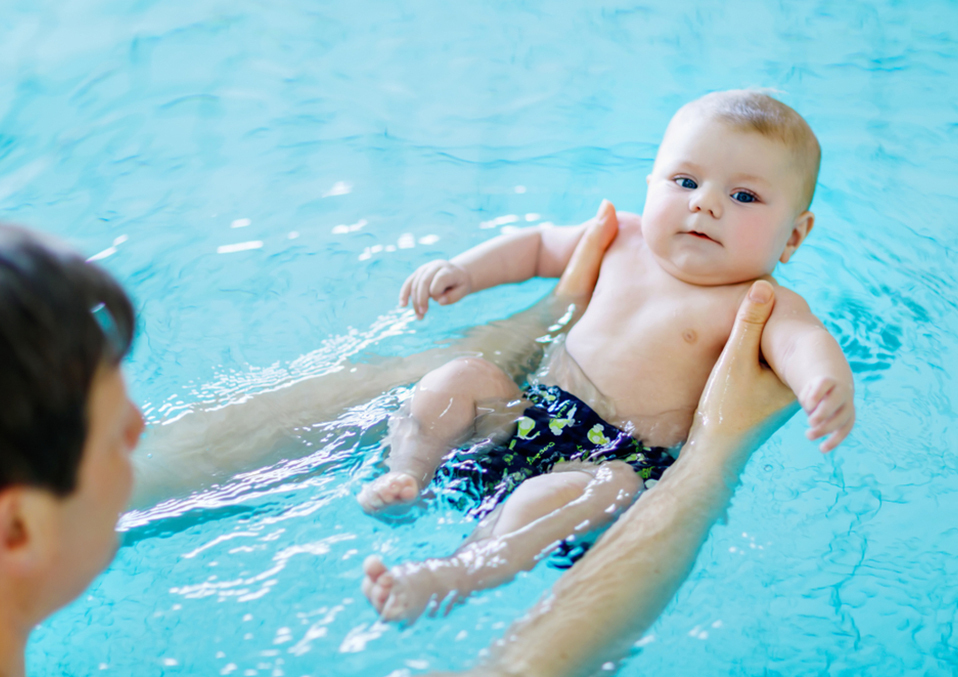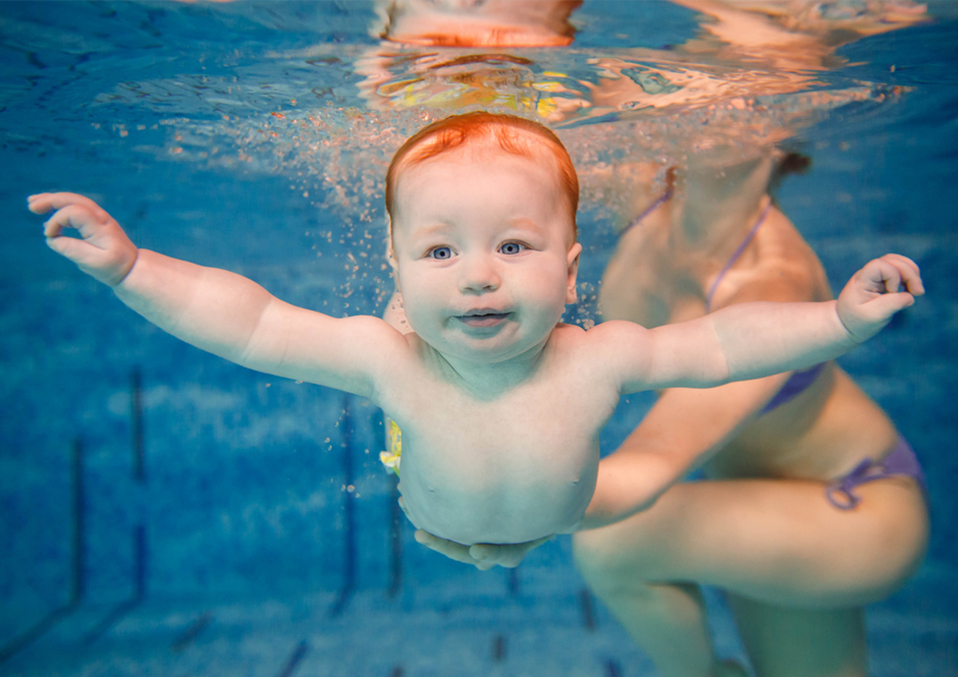When the sun comes back, there’s nothing more fun than spending the day with your family at the pool!
But if you’re a young parent, you’re probably asking yourself a question: How old can a baby be with you in the water?
Your baby can enjoy the pool from the age of 4 months.
It must, however; be in order with regard to its vaccines against pertussis, tetanus, diphtheria, hepatitis B, poliomyelitis and Haemophilus influenza type b (Hib) infections.
Baby Swim!

You will quickly notice that your newborn “swims” alone: when in the water; it naturally performs movements with the legs and arms.
It even holds its breath for a few seconds underwater, in a completely spontaneous way.
It is a reflex that is particularly developed between 4 and 6 months, and that does not disappear before the age of 1 year.
So you will quickly see your baby blossom once his feet are in the water, but of course, always be beside him and support him.
The first sessions at the pool with the baby should not exceed ten minutes.
Depending on your child’s reaction, you can gradually increase the duration of the sessions.
Do not extend more than 30 minutes and be careful if your baby starts to shiver.
If you are going to a public swimming pool, be careful about the water temperature: use a heated swimming pool around 32°C.
Also, avoid a chlorinated swimming pool: it is better to go to an establishment that treats the water by electrolysis of salts.
When To Start Swimming Lessons?
Many institutions offer “our baby swimmer” courses. Depending on the institution, they are available from the age of 4 or 6 months.
The goal is not to learn how to swim (you will have to wait until you are 5 years old for this), but to introduce babies to the pleasures of water.
The sessions are given in the small pool, in groups of about five babies (accompanied by a parent).
A monitor is there to guide, but it is above all the father or mother who supports the baby and who reassures him. This is a very strong moment of complicity!
What Are The Benefits?

If at first taking a baby to the pool is a scary experience, this activity actually has many benefits! Here are a few:
- Accustom baby to immersion.
- Develop an apnea reflex.
- Improve baby’s autonomy.
- Teach the baby to trust him.
- Stimulate its members.
- Develop sensory awareness: gravity, temperatures, noises, water flickering…
- Initiate ventral and dorsal buoyancy.
- Strengthen your relationship and your complicity
The pool is not recommended for newborns with repeated asthma, allergy, eczema or nasopharyngitis.
If your baby is affected by what is mentioned above, consult your pediatrician to find out what type of session and how long it should be.
If your baby has an ear infection, chickenpox or a cold, it is best to wait until he or she recovers completely before going back to school.
Precautions To Be Taken:
If you’ve decided to swim with your baby, don’t stay in the water for too long. In the beginning, stay about ten minutes before increasing the duration of the session gradually.
Never exceed 30 minutes in the water and take your baby out of the water as soon as it shakes. If he refuses to enter the water, do not force him.
This could cause trauma and possible water phobia. Also, avoid swimming if your baby has a cold or is ill or if he has just eaten. As a safety measure, it is best to put on armbands for 6 months.
As soon as the water comes out, remember to rinse it well to remove the chlorine or salt residue, to dry it well and to moisturize its skin after each bath.
Water Activities For Your Child:
If your baby can join a group of swimmers after 6 months, there are other aquatic activities when your child starts to grow up.
Before the age of 6, when your child is mature enough to learn how to swim, it is possible to enroll him in aqua kid sessions or water garden.
It is a playful course to be carried out in the water with many accessories and without the presence of the parents.
This allows your child to become familiar with the aquatic environment, gain autonomy and socialize with other children.
Baby Swimmer, What Exactly Is This?
It is true that the name of the activity is not necessarily explicit, because at baby swimmers we do not teach children to swim at all, but rather to familiarize them with the water, to play all kinds of water games, such as walking on water mats, tobogganing, climbing adapted structures.
First-Year At Baby Swimmers.

During the first pool sessions with a baby, the main thing is to make the child relax by “sliding” on the water with your arms or using a suitable mat.
Then as the months go by; as the child wakes up, you can make him catch objects floating on the water, and walk on all fours on the water mats.
Baby Swimmers With Children Over One-Year-Old
From the moment your child walks and/or moves autonomously and independently, the activity becomes very fun for the whole family.
Exchanges in water with a baby are out of the ordinary. There is no fear of splashing and therefore of putting water everywhere (as in the bath), and especially Dad and mom become playmates for the child!
The sessions are always playful while having a disciplining and sensitizing character for the child.
- We start by taking off our shoes and socks and putting them in our shoe lockers.
- Go to the dressing room and get into the bathing suit.
- Then comes the time of the shower to get wet.
- Then the ritual passage in the footbath.
- And finally, we enter the basin.
Once the meeting is over, we resume all its operations but in the opposite direction.
We go out of the pool, walk through the footbath, take a good shower then we go back to the dressing room and finally, we take back our pair of shoes with our socks and we go home for lunch.
Read Also:
- Why Do Babies Put Everything In Their Mouth
- Babies Sit Up On Their Own: Signs And Actions
- When Can Babies Drink Water And Juice


